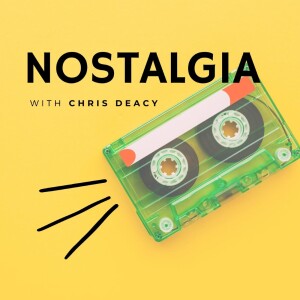
Nostalgia Interviews with Chris Deacy
Society & Culture

For my latest Nostalgia Interview it was a huge pleasure to meet up with Theo Wildcroft.
Theo has undertaken a PhD with the Open University in the area of practice relationships in Yoga and we find out why Theo misses driving time, and will now walk with her greyhound during lockdown. We talk about the importance of having designated work space and we discuss the role of fieldwork in her PhD, which consisted of looking at festivals and camps to which yoga teachers go, and how it is an intense, entangled type of research, involving telling untold stories.
Theo does yoga teacher training and we find out about her background in which she studied languages at Cambridge where she was very impressed by a talk given by Hélène Cixous who prompted her to think of the role of viscerality in language.
Theo talks about finding an inaccessibility in academia and how she waited 10 years before doing her Masters. Her school didn’t have a 6th form and she went from a tertiary college to Oxbridge. We find out why she didn’t tell people about her place at Cambridge and how when she was at Cambridge people literally walked away from her when they found out to which school she had been. We also learn why she didn’t return to the place where she grew up.
We learn that Theo is interested in festival environments and was once involved in the underground rave scene in London. She is also a practical person – and has, for example, put up marquees, leading to a conversation about whether academics are always practical-based.
Towards the end of the interview we discuss the role of trauma and how we are who we are due to the formative things that have happened in our lives. Theo talks about growing up with someone who lied about fundamental things which has a bearing on what she knows to be true about her identity. We discuss being gaslighted by the stories of others and her interest in the processes whereby we make meaning.
We also learn why for Theo the only constant in life is change and why the past and the future are stories that we tell ourselves about the present.
Please note: Opinions expressed are solely those of Chris Deacy and Theo Wildcroft and do not necessarily represent the views or opinions of the University of Kent.
More Episodes
185: Matt Harrington
 2023-12-22
2023-12-22
 2023-12-22
2023-12-22
184: James Grindrod
 2023-12-12
2023-12-12
 2023-12-12
2023-12-12
183: Lucinda Murphy Christmas Special
 2023-11-30
2023-11-30
 2023-11-30
2023-11-30
182: Henry Jeppesen
 2023-11-10
2023-11-10
 2023-11-10
2023-11-10
181: John Wills
 2023-10-30
2023-10-30
 2023-10-30
2023-10-30
180: Katie Marquis
 2023-10-17
2023-10-17
 2023-10-17
2023-10-17
179: Chris Solomon
 2023-10-10
2023-10-10
 2023-10-10
2023-10-10
178: Gary Bunt
 2023-09-26
2023-09-26
 2023-09-26
2023-09-26
177: Anne Pőnisch & Victoria Tomlinson
 2023-09-13
2023-09-13
 2023-09-13
2023-09-13
176: Kate Heffner
 2023-08-31
2023-08-31
 2023-08-31
2023-08-31
174: Terry Lindvall
 2023-08-02
2023-08-02
 2023-08-02
2023-08-02
173: Chris Cotter
 2023-07-21
2023-07-21
 2023-07-21
2023-07-21
172: Krysia Waldock
 2023-07-07
2023-07-07
 2023-07-07
2023-07-07
171: Steve Jacobs
 2023-06-27
2023-06-27
 2023-06-27
2023-06-27
170: Becky Jefcoate
 2023-06-16
2023-06-16
 2023-06-16
2023-06-16
169: Alexander Ornella
 2023-06-02
2023-06-02
 2023-06-02
2023-06-02
168: Maggie Webster
 2023-05-18
2023-05-18
 2023-05-18
2023-05-18
167: Susan Norvill
 2023-05-01
2023-05-01
 2023-05-01
2023-05-01
166: Mina Radovic
 2023-04-17
2023-04-17
 2023-04-17
2023-04-17
012345678910111213141516171819
Create your
podcast in
minutes
- Full-featured podcast site
- Unlimited storage and bandwidth
- Comprehensive podcast stats
- Distribute to Apple Podcasts, Spotify, and more
- Make money with your podcast
It is Free
- Privacy Policy
- Cookie Policy
- Terms of Use
- Consent Preferences
- Copyright © 2015-2024 Podbean.com





